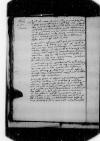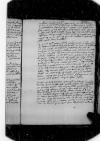Letter #311
Ioannes DANTISCUS to [Stanisław BOREK]Granada, 1526-10-14
Manuscript sources:
Auxiliary sources:
| ||||||||||
Text & apparatus & commentaryPlain textText & commentaryText & apparatus
Reverendissime Domine maior honorande. Salutem et commendationem plurimam.
Accepi
Condolui certe ex animo aegritudini Dominationis Vestrae Reverendae, cuius salus non secus mihi cordi et curae est atque mea propria. Deus Optimus Maximus illam in longa incolumitate conservet ac augeat, faciatque quod aliquando domi una esse possimus, ubi observantiam et gratitudinem erga se meam in effectu cognoscet atque experietur.
Ea, quae mihi scribit de fratro meo
Quod Dominatio Vestra Reverenda accepit solutionem gratum mihi est plurimum, sed quod Lazarus praefectus meus personaliter Dominationem Vestram non accesserat non potest mihi non displicere, scripseram enim illi et iniunxeram, ut Dominationem Vestram in absentia mea pro domino suo haberet et ad illam omnem pecuniam proventuum meorum una cum calculo deferret, et ad Dominationis Vestrae arbitrium se in omnibus dirigeret, illique non minus atque mihi ipsi obsequeretur. Id si hucusque non fecit, do Dominationi Vestrae Reverendae vigore praesentium in omnia mea omnimodam facultatem, Lazarum scilicet deponendi a praefectura et alium substituendi, et quod cum illo et cum omnibus bonis et rebus meis idem, quod ego ipse, facere possit, usque ad meum reditum, qua de re ipsi etiam Lazaro scripsi, ne aliud unquam, quam id, quod Dominatio Vestra voluerit, faciat, rogoque hanc a me provintiam suscipiat Dominatio Vestra, cum neminem alium habeam, ad quem confugi possim.
cf.
De testudine mea, in qua res meas reliqui, faciat Dominatio Vestra ordinem, quod hospite census solitus 5 marcae Polonicales persolvatur, et ubi illam cum filiabus benevolentia sua prosequet[ur], id omne mihi ipsi impensum arbitrabor etc.
Pro novitatibus, quas eo tempore Dominatio Vestra Reverenda ad me perscripsit, habeo Illi immensas gratias. Hic hoc temore non habemus alias, quam quod iterum pro novis pacis conditionibus, ut obsides liberari possint, tractatur, quod si quid boni se obtulerit Dominationem Vestram Reverendam non latebit.
Castrum Barense ex manibus Ferdinandi Alarconis recuperavimus sub ea conditione, quod reginalis maiestas iuxta prius decretam remotionem sequestri insertum castellanum deputare debeat caesari aut viceregi gratum donec aliter cognitum fuerit et quod idem castellanus reginae iurare debeat fidelitatem et caesari nihil aliud, quam ne hoc castrum in manus hostiu[m] tradat aut tradi permittat. Quid in his per vice regem fiet, experiemur.
Alia, quae hic aguntur, ex longo iterum volumine ad maiestatem regiam et reginalem Dominatio Vestra Reverenda intelliget. Scripsit etiam mihi reginalis maiestas in novissimis, quod pro Cracoviensi et Varmiensi ecclesia nominationes mihi obtinuerit. Si quid se offeret in rem meam ad acceptandam vel alias, cum Dominatio Vestra Reverenda sit procurator meus cum facultate substituendi in Madrillis constitutus, agat strenue causam meam, cui numquam futurus sum ingratus, sed Dominationi Vestrae Reverendae semper devinctissimus. Commendo me maximopere et rogo reverendis dominis et amicis meis, quos prius saepius litteris meis descripsi, me commendet et illis obsequia mea offerat.
Datae celerrime in ipsius postae discessu, 14 Octobris anno Domini 1526
Dominationis Vestrae Reverendae deditissimus


